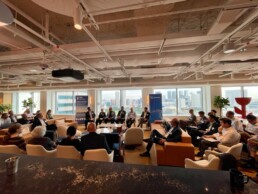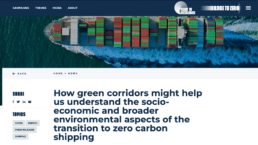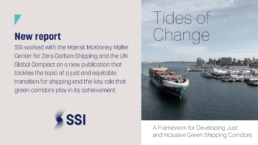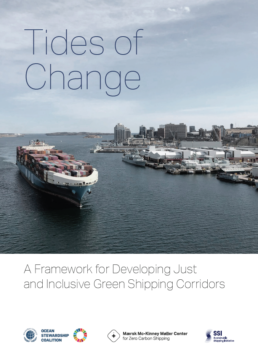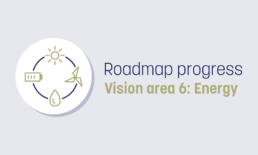Steven Jones
Steven Jones
Sustainable Shipping Initiative
Steven spent a decade working as a navigation officer in the merchant navy, primarily on cable ships. Ashore he has worked in marine fraud investigations, maritime security, and with the UK Department for Business and Trade. He is also the Founder of the Seafarers Happiness Index, a project with the Mission to Seafarers to address the concerns of crew and to ensure that the voice of those at sea is heard, good practices shared, and problems tackled. Steven is also the author of key maritime industry texts on Maritime Security, Piracy, Stowaways and Crime at Sea. He holds a BSc (Hons) in Maritime Studies, and Masters degrees in Marketing, Communications and Public Relations, and also International Relations.

Robert Haggquist
Robert Haggquist
South32
Robert Haggquist is South32’s representative in Sustainable Shipping Initiative. Robert is based in London and handles the company’s freight activities in the Atlantic, Americas and African region. He is also leading the company’s sustainability work on the shipping side and is driving the developments on emissions tools that will aid commercial decisions. Prior to relocating to London Robert was based in Singapore for 6 years, working for BHP Billiton as head of freight analysis and since 2015 for South32 when the company demerged from BHP. Robert started his shipping career with a Swedish owner, before joining Clarksons in London as drybulk freight analyst. Robert has a degree in economics from Gothenburg University and a degree in maritime law and arbitration from NUS.

Christopher Fee
Christopher Fee
Oldendorff Carriers
Christopher Fee is currently Director, Legislative Affairs & Outreach at Oldendorff Carriers, where he has been working for the dry bulk owner and operator since 2013. Christopher moved to the company’s Fleet Department in 2015 to establish a Green Ship Desk and is now engaged in Oldendorff Carriers’ sustainability and industry engagement activities. He has been a Member of BIMCO’s Marine Environment Committee since inception, and presently chairs their Sub-Group on Alternative Fuels. He recently joined the Board of the Liberian Shipowners’ Council and was on the Executive Committee of the Clean Shipping Alliance from its inception in 2018, resigning as Vice Chair in 2022.

‘SEAFAIRER’ Roundtable in Singapore, 2023
28 November 2024 – Marking two years since the publication of the Delivering on Seafarers’ Rights Code of Conduct and accompanying Self-Assessment Questionnaire, the Institute for Human Rights and Business, the Rafto Foundation for Human Rights and the Sustainable Shipping Initiative held the second annual ‘SEAFAIRER’ roundtable in Singapore on 28th November 2023. The event, held under Chatham house rules, was co-hosted by Wilhelmsen Ship Management and Mission to Seafarers, with support from the Swiss Federal Department of Foreign Affairs and the Norwegian Embassy in Singapore.
This annual event brought seafarers and seafarers’ welfare/rights organisations together with charterers, shipowners, ship managers & operators, cargo owners, unions, government and others to to discuss how to tackle the most pressing seafarer welfare challenges, and to review developments in the Code of Conduct implementation.
Read the event summary on IHRB’s website.
How green corridors might help us understand the socio-economic and broader environmental aspects of the transition to zero carbon shipping
This blog is originally posted and taken from the Climate Champions, UNFCCC, Race to Resilience blog. The original blog post can be accessed here.
How green corridors might help us understand the socio-economic and broader environmental aspects of the transition to zero carbon shipping
By Kjersti Aass, United Nations Global Compact; Elizabeth Petit, Sustainable Shipping Initiative; and Anne Katrine Bjerregaard, Mærsk Mckinney Møller Center for Zero Carbon Shipping
Transitioning to zero and near-zero emission economies is at the core of addressing the three planetary crises outlined by the UN: climate change, biodiversity loss, and pollution currently underway. However, decarbonization cannot be treated in isolation. As recognized in the 17 UN Sustainable Development Goals, “ending poverty and other deprivations must go hand-in-hand with strategies that improve health and education, reduce inequality, and spur economic growth – all while tackling climate change and working to preserve our oceans and forests.”
Shipping is deeply integrated in 80 percent of global trade flows and therefore a central part of the necessary systems change towards zero and near-zero emission economies. But the shipping industry can only truly succeed with decarbonization if the socio-economic and broader environmental impacts of the transition are adequately understood and addressed.
In July 2023 the International Maritime Organization agreed on a 2023 greenhouse gas strategy signaling early industry commitment to phasing out GHG emissions from international shipping as well as promoting a just and equitable transition.
What does Just and Equitable mean in a shipping context?
The International Labour Organization defines a just transition as “greening the economy in a way that is as fair and inclusive as possible to everyone concerned, creating decent work opportunities and leaving no one behind”. In their ‘Introduction to just transition – a business brief’, the UN Global Compact further explores how the private sector can “help achieve a just transition through own policies and strategies, but also by advocating for a public policy environment which is conducive to a just transition for all”.
This ambition is further detailed in the context of shipping by UNCTAD and UCL in an article published in 2022 outlining the elements of what a just and equitable transition could entail for maritime. The authors argue that a just and equitable transition for the shipping industry should be socially just, globally equitable, technologically inclusive, and procedurally fair: “a globally equitable transition considers disparities between nations and whether action taken to address climate change would exacerbate or explicitly seek to mitigate them.”
Green corridors is a concept that is still somewhat maturing and is, until now, predominantly focused on demonstrating the technical and regulatory feasibility of low- or zero carbon shipping, why does it make sense to expand scope?
As recognized by the increasing number of signatories to the Clydebank Declaration a key accelerator of early transition is green shipping corridors – large scale demonstration projects that enable sustainable shipping solutions in and between selected ports. Once operational, green corridors can speed up the development of alternative fuel supply chains and new business models across the maritime ecosystem. Green corridors have the potential to strengthen the confidence in the feasibility of green shipping solutions and catalyze global action towards the energy transition.
However, green corridors can demonstrate more than the technical and regulatory feasibility. In fact, due to their systems perspective and involvement of stakeholders across the value chain as well as national and/or regional authorities, they are uniquely positioned to act as demonstration projects for socio-economic and environmental impact. By expanding the scope of work, we can use green corridors to help us understand how the transition might impact the people and communities involved, and how we can leverage the energy transition to ensure sustainable development across several dimensions.
Can green corridors help assess and unlock benefits for countries in support of their wider transition aims?
To keep a 1.5*C in sight, we need to urgently cut emissions across all sectors including shipping. However, it must be done in a sustainable way. This requires awareness of the socio-economic and broader environmental risks and opportunities as mentioned above, but it also requires a truly global approach.
In addition, and as we navigate the transition away from fossil fuels, it is crucial to reflect on and address the existing injustices embedded in today’s global economy, such as unequal access to energy, food and water, economic disparities between the Global South and Global North, and social inequities.
Applying a just and equitable transition lens to green corridors will help stakeholders shape a transition that not only mitigates negative impact but also ensures that the benefits of green shipping corridors are shared inclusively across communities and nations. Green corridors can help unlock benefits for countries – such as accelerating the development of sustainable fuel production, enabling knowledge and technology transfers, building local capacity and creating green jobs, supporting a country’s wider transition aims, and improving access to clean energy. This is particularly true for many developing countries placed in areas with an abundance of solar or wind.
How do you envision green corridor consortia to integrate a just and equitable lense in their respective projects?
We hope that the report ‘Tides of Change: a Framework for Developing Just and Inclusive Green Shipping Corridors’ can help create awareness and that the concrete recommendations included can help shape the conversation between consortia members – public and private. We also hope that, inspired by the report, future green corridor projects will adopt our ambition of consciously pursuing synergies across socio-economic and broader environmental aspects as well as mitigate potential risks.
For a green corridor to unleash its full potential, it is key that just and equitable does not become an afterthought. The approach and awareness must be integrated throughout the development phases of a green corridors. It is evident that this requires significant collective action, but also that the benefits of this approach will spread far beyond the shipping industry benefiting individuals, communities, and countries.
The seafarers will play a key role in green corridors and a decarbonized shipping industry in general. What is concretely being done in the industry to ensure the seafarers are ready?
The Maritime Just Transition Task Force – a cooperative undertaking by UN Global Compact, ILO, IMO, ICS and ITF, and a first of its kind in any industry – has announced a new training project that will prepare seafarers for the new fuels: ammonia, methanol, and hydrogen. Lloyd’s Register will deliver the training framework for seafarers and officers, as well as an instructor handbook for maritime training institutions, and the World Maritime University will provide academic expertise and lead a train-the-trainer programme trial roll-out. Lloyd’s Register Foundation and IMO are the primary funders, and several organizations will contribute with their expertise. 800,000 seafarers may require additional training by the mid-2030s in order to operate vessels. The project aims to utilize the combined strengths of the global maritime community and puts seafarers at the heart of the solution.
The report ‘Tides of Change: a Framework for Developing Just and Inclusive Green Shipping Corridors’ was released on 4 December 2023 during COP28
New framework for developing just and inclusive maritime green corridors that create opportunities for both people and countries
New York / London / Copenhagen, December 4 2023 - Transitioning away from fossil fuels must include careful effort to avoid perpetuating the injustices present in today’s global economy, and instead ensure a just and equitable transition. A new report "Tides of Change: A Framework for Developing Just and Inclusive Maritime Green Corridors" co-created by the UN Global Compact, the Mærsk Mc-Kinney Møller Center for Zero Carbon Shipping, and the Sustainable Shipping Initiative outlines the necessary considerations and actions required from companies and governments involved in establishing green shipping corridors around the world.
Recommendations made in the report for a just and equitable transition towards net zero include:
- Ensuring green corridors leverage wider transition aims regionally/locally including improved access to clean energy, the development of decent, sustainable jobs, a diverse and inclusive workforce and capacity building but also improved air quality and preservation of biodiversity and ecosystems regionally.
- Creating decent, sustainable jobs and workforce up-skilling. In the process of establishing green corridors, stakeholders can test and demonstrate how to conduct inclusive social dialogue with affected groups.
- Advocating for strengthening institutional and regulatory frameworks that promote inclusion and protection of the most affected stakeholders.
On the launch of the new joint report, Sanda Ojiambo, CEO and Executive Director of the UN Global Compact said:
“Putting the technologies in place to produce zero emissions fuels for use in the shipping industry will require a complex and coordinated effort across multiple industries and governments. Green corridors will help create the necessary enabling environment between the private and public sector to bring such initiatives to scale. This paper aims to encourage engagement with civil society organizations and communities, ensuring a human-centered approach to the development of green corridors.”
CEO of the Mærsk Mc-Kinney Møller Center for Zero Carbon Shipping, Bo Cerup Simonsen says:
“We need the green corridors to not only demonstrate technical feasibility and regulatory compliance but also address the socio-economic dimensions comprehensively. The right approach can help us better understand and leverage the wider potential, nurture inclusive growth, create green, decent jobs, and enhance social dialogue for a future that honors both our planet and its people."
Sustainable Shipping Initiative CEO Steven Jones says:
“Shipping’s actions today are building the foundation for a resilient industry tomorrow. In order to do so, we need to ensure that shipping’s decarbonization is sustainable-environmentally, socially and socioeconomically. By taking concrete steps to incorporate principles of fair labor practices, community engagement, and inclusivity, green corridor consortia can play a key role in establishing a sustainable shipping sector that is decarbonized, just, and equitable.”
To see the full report please go to www.zerocarbonshipping.com/publications
-- ENDS --
Notes to Editors
What are just green shipping corridors?
Green corridors demonstrate the technical and regulatory feasibility of zero emission shipping with the involvement of stakeholders across the value chain. In the course of the transition away from fossil fuels, careful effort must be made to avoid perpetuating the injustices present in today’s global economy, and instead ensure a just and equitable transition. Because they are closed systems, green corridors can also be used to better understand and leverage the potential social and socio-economic benefits associated with the transition away from fossil fuels, as well as understand and mitigate potential risks and trade-offs.
About the UN Global Compact
As a special initiative of the United Nations Secretary-General, the UN Global Compact is a call to companies worldwide to align their operations and strategies with Ten Principles in the areas of human rights, labour, environment and anti-corruption. Our ambition is to accelerate and scale the global collective impact of business by upholding the Ten Principles and delivering the Sustainable Development Goals through accountable companies and ecosystems that enable change. With more than 18,000 companies and 3,800 non-business signatories based in more than 160 countries, and 62 Local Networks, the UN Global Compact is the world’s largest corporate sustainability initiative — one Global Compact uniting business for a better world. The Ocean Stewardship Coalition is a convening point at the UN Global Compact for ocean related industries, academic institutions, financial actors, governments and UN institutions. For more information, visit our website at unglobalcompact.org.
UNGC Media Contact: Alex Gee, gee@unglobalcompact.org
About the Mærsk Mc-Kinney Møller Center for Zero Carbon Shipping
The Mærsk Mc-Kinney Møller Center for Zero Carbon Shipping (MMMCZCS) is an independent, not-for-profit research and development center established in 2020 with funding from the A.P. Moller Foundation. Our purpose is to guide and accelerate decarbonization of the global maritime industry. Working with our partners, governments, authorities, public sector bodies, scientists, and organizations across the global maritime industry we aim to inform, de-risk decision-making, and spark real climate action. Strategic Partners to the Center include: Alfa Laval, American Bureau of Shipping, A.P. Moller - Maersk, bp, Cargill, CF Industries, Equinor, DP World, Hapag-Lloyd, MAN Energy Solutions, Mitsubishi Heavy Industries, Mitsui, NORDEN, NYK Line, Rio Tinto, Royal Caribbean Group, Seaspan Corporation, Siemens Energy, Stolt Tankers, Sumitomo Corporation, Swire Group, Topsoe, TotalEnergies and V.Group. For more information, please visit www.zerocarbonshipping.com
Center Media Contact: Anders Kongstad, Media & Digital Partner | +45 535 04 179 | anders.kongstad@zerocarbonshipping.com
About the The Sustainable Shipping Initiative (SSI)
The Sustainable Shipping Initiative (SSI) is a multi-stakeholder collective of ambitious and like-minded leaders, driving change through cross-sectoral collaboration to contribute to – and thrive in – a more sustainable maritime industry. Spanning the entire shipping value chain, SSI members are shipowners and charterers; ports; shipyards; marine product, equipment and service providers; banks, ship finance and insurance providers; classification societies; and sustainability non-profits.Guided by the Roadmap to a sustainable shipping industry, SSI works on a range of issues related to enabling and furthering sustainable shipping, including shipping’s decarbonisation, and seafarers’ labour and human rights.For more information, please visit www.sustainableshipping.org
SSI Media contact: Elizabeth Petit González, Head of Partnerships and Communications, e.petit@sustainableshipping.org
Tides of Change: A Framework for Developing Just and Inclusive Green Shipping Corridors
Transitioning away from fossil fuels must include careful effort to avoid perpetuating the injustices present in today’s global economy, and instead ensure a just and equitable transition. A new report “Tides of Change: A Framework for Developing Just and Inclusive Maritime Green Corridors” co-created by the UN Global Compact, the Mærsk Mc-Kinney Møller Center for Zero Carbon Shipping, and the Sustainable Shipping Initiative outlines the necessary considerations and actions required from companies and governments involved in establishing green shipping corridors around the world.
Recommendations made in the report for a just and equitable transition towards net zero include:
- Ensuring green corridors leverage wider transition aims regionally/locally including improved access to clean energy, the development of decent, sustainable jobs, a diverse and inclusive workforce and capacity building but also improved air quality and preservation of biodiversity and ecosystems regionally.
- Creating decent, sustainable jobs and workforce up-skilling. In the process of establishing green corridors, stakeholders can test and demonstrate how to conduct inclusive social dialogue with affected groups.
- Advocating for strengthening institutional and regulatory frameworks that promote inclusion and protection of the most affected stakeholders.
This report describes what the stakeholders involved in green corridors project consortia must consider in order to contribute to a just transition. It is evident that this requires significant collective action, but also that the benefits of this approach will spread far beyond the shipping industry benefiting individuals, communities, and countries.
Sustainable First Movers Initiative Identification Tool
Progress against milestone 6.2020.4:
Research, development and production of sustainable zero (or low) carbon fuels are scaled up, with guidance on their use and prototypes deployed for early adopters.
Environmental Defense Fund (EDF) and Lloyd’s Register Maritime decarbonisation hub collaborated with ARUP to create the Sustainable First Movers Initiative Identification Tool. The tool helps shipping stakeholders align investment decisions that support maritime energy transition away from fossil fuels. It scores ports potential to produce and bunker electrofuels and deliver local and environmental benefits that align with the Paris agreement.
Source: Lloyd’s Register
Welcoming Steven Jones to the SSI
Wednesday 29 November – Today, members welcomed incoming CEO, Steven Jones, at SSI’s bi-annual in-person member meeting in Singapore.
“As the new CEO of The Sustainable Shipping Initiative, I am thrilled to lead this pioneering organisation at a crucial juncture for our industry. The dedication of our members, team and partners from across the maritime sector, collaborating under a shared commitment to sustainable shipping, is truly inspiring.
Together, we possess invaluable knowledge and experience to chart our course toward a sustainable maritime industry. Beyond scanning the horizon, SSI actively addresses the challenges looming over it. SSI’s vision and purpose continues to persist as we collectively harness our expertise and thought leadership to spearhead ambitious initiatives to accelerate innovation and drive our industry’s just transition.”
– Steven Jones
Steven has joined the SSI following Andrew Stephens’ decision to step down from his position as Executive Director. Having led the SSI for 5 years, Andrew has overseen the curation and implementation of a new strategy and expanded work programmes to address systemic sustainability issues in shipping. He has also driven increased diversity in SSI membership, from the addition of human rights expertise through NGO member the Institute for Human Rights and Business (IHRB) to the first port member, Port of Vancouver. Andrew will be leaving the SSI at the end of the year.

SSI at COP28
SSI will be at the 2023 UN Climate Change Conference (COP28) in Dubai, United Arab Emirates. Throughout COP28, we will be involved with various events and media relating to a plethora of matters around sustainable shipping.
Join us at the COP events:
Could some of the world’s largest ports, like Houston, Shanghai and Lázaro Cárdenas, become unusable due to sea level rises?
The triple climate crisis poses an existential threat to global shipping, responsible for 3% of emissions. By 2050, a 40cm sea level rise could devastate coastal communities worldwide. Explore learnings from the Global Maritime Trends Report 2050 on this urgent challenge. Discover innovative solutions and steps the maritime sector can take to curb emissions and prevent climate catastrophe, securing a sustainable future for our oceans and our planet. Elizabeth Petit González from SSI will be on the panel.
- Date: Tuesday 5th December
- Time: 12:30 – 13:30 (GST)
- Location: Ocean Pavilion, Blue Zone
- Organisers: Lloyd’s Register Foundation
- Livestream: Ocean Pavilion YouTube channel
Staying on Course for 1.5: Africa’s role in accelerating shipping’s green transition.
A 1.5-degree pathway will be impossible without shipping’s rapid, just and equitable green transition. Africa has a crucial role to play in this. This event will bring together key shipping stakeholders to highlight credible climate action and solutions during a pivotal year, including in response to a new GHG strategy at the IMO. This event will have french translation live during the event.
- Date: Tuesday 5th December
- Time: 15:00-16:30 (GST)
- Speakers: Ruth Boumphrey, CEO, Lloyd’s Register Foundation; Magda Kopczyńska, Director General of the Directorate-General Mobility and Transport; James Myunpe, Presidential Economic Advisor and Hydrogen Commissioner, Government of the Republic of Namibia; Funmi Folorunso, Secretary General, African Shipowners Association; Camille Bourgeon, Technical Officer – Marine Environment Division, International Maritime Organization; Sam Megwa, African Maritime Lead, UN High-Level Climate Champions Team; Lydia Ngugi, President of MTCC Africa
- Organisers: Sustainable Shipping Initiative, Lloyd’s Register Foundation
- Location: SE Room 6, Blue Zone
- Livestream link: UN Climate Change events YouTube channel
Navigating the Future: Bridging shipping, biodiversity, and decarbonisation.
Join us to explore how decarbonising shipping can have a nature-positive impact on ocean health and biodiversity.
There has been increasing focus on the need – and opportunity – to decarbonize international shipping. However, a sustainable, resilient maritime industry needs to consider not only how to decarbonize, but also other environmental, social, and socio-economic impacts. Now is the time to ensure that the growing momentum to decarbonize is informed by and coordinated with efforts to improve shipping’s overall impact on the ocean. Recognizing that this is interconnected, it is crucial to understand how shipping operations currently impact the environment around them, and to research and develop solutions for decarbonization that also consider these other ocean impacts and have potential co-benefits in addressing ocean health and biodiversity loss.
Moderated by Susan Ruffo, UN Foundation Senior Advisor for Ocean and Climate, this event will explore shipping’s short and long-term impact on ocean health, productivity and biodiversity, identify links between actions to decarbonize and to protect ocean health and anchor these in the shipping community through best practice.
- Date: Friday 8th December
- Time: 15:00 -16:00 (GST)
- Organisers: Equal Routes, Race to Zero, Sustainable Shipping Initiative, UN Foundation
- Location: State of Green Pavilion, Blue Zone
Look out for the SSI in the Race to Zero blog and COP daily news.
- Tuesday 5th December – Green steel in shipping: How international shipping can lower emissions through progressive adoption of green steel
- Wednesday 6th December – How green corridors might help us understand the socio-economic and broader environmental aspects of the transition to zero carbon shipping

